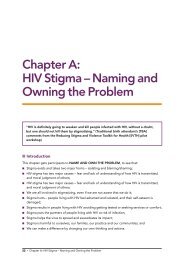Implementing Multiple Gender Strategies to Improve HIV and ... - ICRW
Implementing Multiple Gender Strategies to Improve HIV and ... - ICRW
Implementing Multiple Gender Strategies to Improve HIV and ... - ICRW
You also want an ePaper? Increase the reach of your titles
YUMPU automatically turns print PDFs into web optimized ePapers that Google loves.
Challenges <strong>and</strong><br />
Unforeseen<br />
Outcomes<br />
• The initial challenge was identifying <strong>and</strong> partnering with qualified CBOs.<br />
• CBOs within the partnership can be at different levels of capacity <strong>and</strong><br />
getting them <strong>to</strong> work <strong>to</strong>gether as one is, at times, a challenge.<br />
• Overly high expectations lead <strong>to</strong> disappointments. Follow-up <strong>to</strong> the pilot<br />
phase <strong>and</strong> moni<strong>to</strong>ring was <strong>to</strong>o intense, <strong>and</strong> staff had <strong>to</strong> log long <strong>and</strong><br />
hard hours of work.<br />
• Many issues not originally anticipated in the planning phase can<br />
emerge as the implementation progresses. The staff was permanently<br />
on their <strong>to</strong>es thinking of new ways of addressing emerging issues. This<br />
was exciting <strong>and</strong> challenging at the same time.<br />
Recommendations<br />
for Replication<br />
• Do not “reinvent the wheel” <strong>and</strong> expend resources where they already<br />
exist; rather, use the existing community <strong>and</strong> government structures <strong>to</strong><br />
support the project.<br />
• Involve the beneficiaries as much as possible in the project planning.<br />
• The project must have adequate resources <strong>and</strong> the flexibility <strong>to</strong> change<br />
<strong>and</strong> meet the needs of the beneficiaries.<br />
• To ensure that the project is comprehensive enough <strong>to</strong> address the<br />
needs of <strong>HIV</strong>-vulnerable households, it must have adequate funding.<br />
• Government support is crucial.<br />
• It is important <strong>to</strong> have community support for <strong>and</strong> ownership of the<br />
project.<br />
• Consider partnering with other organizations that offer a variety of key<br />
services within the project area; encourage collaboration <strong>and</strong><br />
networking.<br />
ADDITIONAL INFORMATION<br />
Program<br />
References <strong>and</strong><br />
Resources<br />
An end-of-pilot project executive summary, write-ups, two-page activity<br />
briefs <strong>and</strong> DVD produced during the pilot phase can be obtained by<br />
contacting FHI.<br />
Contact Information<br />
Family Health International, Kenya<br />
P.O. Box 13208 Nakuru, Kenya<br />
Tel: + 254 51 221 5568<br />
Website: http://www.fhi.org/en/CountryProfiles/Kenya/index.htm<br />
Ruth Odhiambo, Deputy Direc<strong>to</strong>r<br />
Email: rodhiambo@aphiarift.org<br />
63
















